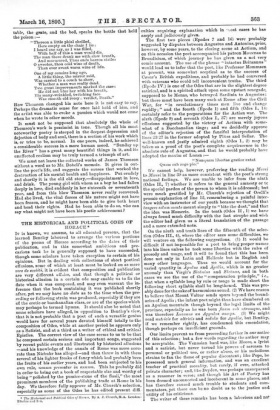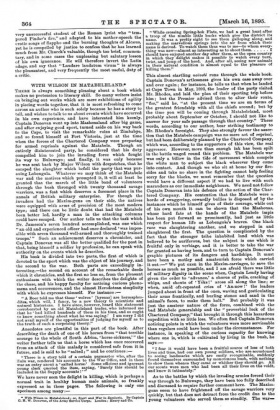THE HISTORICAL AND POLITICAL ODES OF HORACE.*
IT is known, we assume, to all educated persons, that the learned Bentley laboured to arrange the various portions of the poems of Horace according to the dates of their publication, and in this somewhat ambitious and pre- carious task be is generally supposed to have succeeded, though some scholars have taken exception to certain of his opinions. But in dealing with collections of short poetical effasione, some of which at least must be looked on as mere vers de societo, it is evident that composition and publication are very different affairs, and that though a political or historical allusion in a certain ode may enable us to fix the date when it was composed, and may even warrant the in- femme that the book containing it was published shortly after, yet we may have no data as to the time when the pre- ceding or following strain was produced, especially if they are of the erotic or bacchanalian class, or are of the species which may perhaps be termed hymns. It should also be noted that some scholars have alleged, in opposition to Bentley's view, that it is not probable that a poet of such a versatile genius would have for several years devoted himself totally to the composition of Odes, while at another period he appears only as a Satirist, and at a third as a writer of ethical and critical Epistles. The correct view of the case seems to us to be that he composed certain serious and important songs, suggested by recent public events and illustrated by historical allusions —and his knowledge of the annals of Rome was more accu- rate than Niebuhr has alleged—and then threw in with them several of his lighter freaks of fancy which had probably been the fruits of his earlier years, and had been subjected to his own rule, nanum pram afar in annum. This he probably did in order to bring out a book of respectable size and worthy of being "polished by the pumice-stone of the Sasii," the most prominent members of the publishing trade at Rome in his day. We therefore fully approve of Mr. Church's selection, especially as some of the Odes he has edited present diffi.
• The Historical and Political Odes of Horace. By A. J. Church. N.A. London: Blackie and Son.
culties requiring explanation which in -1:ost eases he has amply and judiciously given.
The first two pieces (Epodes 7 and 16) were probably suggested by disputes between Augustus and Antonins, prior, however, by some years, to the closing scene at Actium, and on this occasion the poet accompanied his patron Mamenas to Brundisium, of which journey he has given us a not very comic account. The use of the phrase " intactus Britannue would lead us to infer that the poet, like Professor Mommsen at present, was somewhat sceptical as to the success of Csesar's British expeditions, and probably he had conversed with veterans who could tell inconvenient truths. The third (Epode IV.) is one of the Odes that are in the slightest degree- satirical, and is a spirited attack upon some upstart renegade, supposed to be Menas, who betrayed Sardinia to Augustus but there must have been many each at Rome after the Civil War, for "in revolutionary times men live and change rapidly ; " and the fourth (Epode 1) and fifth (Odes I., 141 certainly refer to the preparations for the Actian war. The sixth (Epode 9) and seventh (Odes I., 37) are merely joyous effusions suggested by the victory of Actium with some- what of a Bacchanalian tinge; and we decidedly approve- of the editor's rejection of the fanciful interpretation of lines 23.27 in the former adopted by Miles and Seller. The well-known and justly admired eighth (Odes I., 2) may be taken as a proof of the poet's complete acquiescence in the absolute rule of Augustus, and that he would probably have adopted the maxim of Lucan "Nunquam libertas gratior extat Quam sub rege pio."
We cannot help, however, preferring the reading Marsi to Mausi in line 39 as more consistent with the poet's strong national feelings. We are unable to infer from the ninth (Odes II., 7) whether it refers to the general amnesty or to the special pardon of the person to whom it is addressed ; but were much gratified by Mr. Church's rejection of Oral's. prosaic explanation of line 12, remembering a painful inter- view with an instructor of our youth because we thought that tangere solum mento meant simply to "bite the dust," and that the idea was Homeric. In the tenth (Odes II, 1) we have always found much difficulty with the last strophe and wish the editor had given us a literal translation of the passage and a more extended note.
On the ninth and tenth lines of the fifteenth of the selec- tion (Odes III., 4), where the editor sees some difficulties, we will venture on the following suggestions. (1) It would be difficult if not impossible for a poet to bring proper names into his lines unless he took some liberties with the rules of prosody and usage, and it will be found that this has been done not only in Latin and Hellenic but in English and many other languages. Thus we would account for the varied quantity in Apulus and Apulia, which is no greater anomaly than Virgil's SW:tills and Sfecinue, and in both cases we see the use of the "compensation principle," i e., that when a syllable long by rule or usage is made short the following short syllable shall be lengthened. This was pro- ably done for the sake of harmonious sound. (2) We have reason to believe that Mount Voltur sends spurs beyond the bound- aries of Apulia ; the infant poet might thus have slumbered on an Apulian mountain though beyond the legal limits of the province, especially as he was born finem sub utrumgue, and was therefore Lucanus an Appulus anceps. (3) We might read nutricis for altricis and sedulw for Apuliw, but Bentley, if we remember rightly, has condemned this emendation, though perhaps on insufficient grounds.
Our limits prevent us from proceeding farther in our notice of this selection ; but a few words regarding the author may be acceptable. The Venusian bard was, like Moore, a lyrist and a satirist, but never turned his powers of sarcasm to personal or political use, or rather abuse, or his melodious. strains to fan the flame of popular discontent; like Pope, he possessed much general information, and was an excellent teacher of practical morality, but rarely, if ever, attacked private character; and, like Dryden, was perhaps unsurpassed as a reasoner in verse; and though his Art of Poetry has been deemed unconnected and incoherent in some places, and has therefore caused much trouble to students and com- mentators, yet there can be no doubt as to the justice and utility of his criticisms.
The writer of these remarks has been a laborious and not
very unsuccessful student of the Roman lyrist who "tern. pered Pindar's fire," and adapted to his mother-speech the erotic songs of Sappho and the burning thoughts of Alcisus, yet be is compelled by justice to confess that he has learned much from Mr. Church's valuable, though too brief, commen- tary, and in some cases the unpleasing but salutary lesson of his own ignorance. He will therefore invert the Latin adage, and say that "Landare laudatum virum" is always the pleasantest, and very frequently the most useful, duty of a critic.



































 Previous page
Previous page